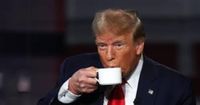The trade agreement between the United States and the United Kingdom represents a major step towards strengthening economic partnership between the two countries. The agreement aims to facilitate trade barriers and expand economic cooperation to open markets and increase trade, including reducing American tariffs and new facilities in agricultural and manufacturing trade, which provides a strong impetus for economic cooperation between Washington and London.
The agreement aims to achieve multiple benefits, including improving access to American agricultural products to British markets in a larger way, and providing an opportunity to export 13 thousand metric tons of American beef annually. The United Kingdom also offers its American tariffs on American ethanol in an amount of up to 1.4 million liters, which enhances agricultural cooperation between the two countries. The agreement also included facilities related to car trade and steel between the two parties, with the aim of supporting local industries and stimulating job opportunities.
In the manufacturing sector, the United States responded to British manufacturing demands by raising American tariffs on British steel products, while offering facilities for the British Rolls Royce company, which opens new horizons for British economic activity, and is expected to lead to strengthening British industry and pushing the wheel of trade to the fore.
The United Kingdom is considered the fourth largest market for American exports, accounting for about 4.5% of total American exports. This agreement carries symbolic and economic importance, as it seeks to secure agreements worth 5 billion dollars for new exports such as agricultural products, aircraft engines and equipment. From the symbolic side, it enhances the image of the United States as a promoter of free trade in global markets.
The agreement contributes to achieving a balance between the economic interests of both parties, as the agreement came to reduce the average British tariffs on American goods to 1.8%, considering that a reduction of 200 million dollars reassures American exporters and contributes to reducing the cost of American products to British consumers.
It is expected that the agreement will have a positive impact on several sectors, including manufacturing, agriculture and aviation, while it will reflect positively on sectors of employment in both countries. This agreement also contributes to increasing the competitiveness of British exports in the American market and promotes related industries such as cars, spare parts and aircraft, in addition to providing production opportunities previously available to American companies in the field of agricultural and mining products.
The American reforms included in the agreement contribute to improving investment and trade environments and granting companies and investors a greater opportunity to interact with foreign products of high quality, which contributes to a new era in economic relations between the two countries and increases the sustainability of this partnership in the long term.
British Prime Minister, Keir Starmer, has warned the American President, Donald Trump, against Chinese investments in Britain, after the announcement by the two leaders of a trade agreement that includes reducing American tariffs on steel and cars for British companies and increasing trade. Trump said that the two countries will enjoy a relationship better than any time in the past and that the agreement came because of Britain's exit from the European Union.
Starmer added that the agreement "protects jobs, preserves them, and enhances them," especially in the luxury car sector, where American tariffs on cars will decrease from 25% to 10%, while the equivalent on aluminum and steel will decrease from 25% to zero. A source for the Telegraph newspaper revealed that under the terms of the agreement, the United States will commit to not objecting to Chinese companies investing in the United Kingdom, while describing those who are concerned as having "the right to criticize."
The agreement stipulates that both countries respect cooperation in the field of using effective means for ensuring investment security, which includes preventing Chinese espionage activities. An economic source stated that the United States does not have the right to veto, but Washington can begin its concerns about the Chinese companies' exploitation of key infrastructure, which may lead to activating a national security law, which allows ministers to interfere in exploitation activities for reasons related to national security.
A source for the Telegraph said that the agreement represents a "kind of veto" for the United States on major Chinese investments that were of high importance to the Americans during recent events, and British Interior Minister, Priti Patel, stated in the government that Washington's tolerance in foreign investment decisions shows that Starmer has made too many concessions to Trump.
The agreement is not a comprehensive trade deal, but it will reduce tariffs on British cars and steel, while granting American companies some tariff-free access to UK markets for beef and ethanol, with a quota system. Additionally, the agreement requires the United States and the United Kingdom to collaborate in future technology initiatives, and during the discussions, a major British airline committed to purchasing aircraft and parts worth $10 billion from American company Boeing.
Britain will receive preferential treatment when the United States imposes tariffs on specific sectors, which Trump intends to increase on foreign pharmaceutical companies and film studios, both of which are significant British exports. According to reports, the American president's concerns regarding Chinese investments in Britain follow warnings that Beijing already exerts excessive control over British infrastructure, including through partnerships in battery technology and offshore wind energy.




